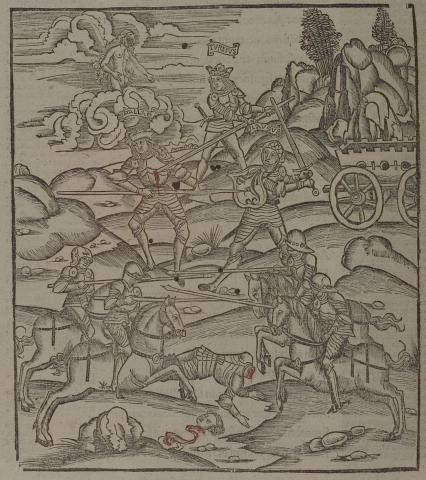CORE VOCABULARY
rotō, āvī, ātus, 1, n. and a.: to move like a wheel; whirl about, 10.362; to brandish, 10.577. (rota)
lātē: (adv.), widely; far and wide, 1.21; on all sides, far around, 1.163; all over, 12.308. (lātus)
torreō, uī, tostus, 2, a. and n.: to burn, scorch, roast, parch, 1.179; rush, roll, 6.550; of a river bank, 9.105; p., torrēns, entis, subst., a torrent, 7.567.
arbustum, ī, n.: a growth of trees; a grove; thicket, 10.363. (arbor)
dīruō, uī, utus, 3, a.: to overthrow, tear apart or away from, 10.363.
Arcas, adis, m.: an Arcadian, 10.452;(adj.), 11.835.
īnsuētus, a, um (trisyll.): (adj.), unaccustomed; unused, unwonted, 6.16; (pl. n. as adv.), īnsuēta, strangely; hideously, 8.248.
pedestris, e: adj. (pedes), pedestrian; unmounted; on foot, 10.364.
Pallās, antis, m.: 1. A king of Arcadia, great-grandfather of Evander, 8.51. 2. Pallas, son of Evander, 8.104, et al.
Latium, iī, n.: a country of ancient Italy, extending from the left bank of the lower Tiber to Campania, 1.6; (meton.), for Latīnī, the Latins, people of Latium, 10.365, et al. (2. latus; Virgil, 8.323, derives it from lateō)
sequāx, ācis: adj. (sequor), prone to follow; following, pursuing, swiftly pursuing; darting, lambent, 8.432; rapid, 5.193.
asper, era, erum: (adj.), rough, 2.379; rugged, craggy, jagged, 6.360; chased, embossed, 5.267; (fig.), of the weather, stormy, 2.110; of temperament, spirit, or nature, barbarous, 5.730; formidable, fierce, 1.14; full of strife, warlike, 1.291; cruel, stern, 6.882; angry, 1.279; bitter, 2.96; displeased, 8.365.
suādeō, suāsī, suāsus, 2, n. and a.: to advise, warn, urge, exhort, 1.357, et al.; invite, 2.9; impel, prompt, 11.254; compel, force, 10.367.
restō, restitī, 1, n.: to remain in place; to stand, stop; to be left, 2.142; remain, 1.556; remain for infliction, wait to be repeated, be in reserve, 10.29; w. abl., 1.679.
egēnus, a, um: adj. (egeō), needy; in want, destitute, 1.599; distressed, straitened, imperiled, desperate, 10.367.
dictum, ī, n.: a thing said; word, 1.197; command, precept, injunction, 1.695; promise, 8.643. (dīcō)
accendō, ī, cēnsus, 3, a.: to set fire to, light up, enkindle, 5.4; enrage, exasperate, incense, 1.29; incite, rouse, 4.232. (ad and candō, rel. to candeō)
amārus, a, um: (adj.), bitter, brackish, salt, briny; (fig.), bitter, 4.203; biting, 11.337; cruel, 10.900.
Euander (-drus, 8.100; Ēvander, -drus), drī, m.: Evander, an Arcadian prince, son of Carmentis, and king of Pallanteum on the Tiber, 8.52.
dēvincō, vīcī, victus, 3, a.: to conquer completely, to vanquish, 9.264; wage successfully, 10.370.
patrius, a, um: adj. (pater), pertaining to one's father or ancestors; a father's, 2.658; paternal, natural to a father, 1.643; exacted by a father, 7.766; due to, felt for a father or parent, 9.294; ancestral, hereditary, 3.249; of one's country, native, 3.281; belonging to the nation, of the country, 11.374.
subeō, iī, itus (p. subiēns, euntis), 4, n. and a.: to go or come under, into, or up to; alone, or with acc. and prep., or with dat.; without a case, come up, 2.216; go under, bend, stoop down under, 10.522; come after; follow, 2.725; take one's place, 12.471; enter, 1.171; come into or upon the mind, suggest itself, occur, 2.560; with acc. and prep., go, advance towards, 8.359; with dat., come or go up to, down to, into, 5.203; succeed to, 5.176; come after, follow, 10.371; with acc., approach, enter, 1.400; go under a burden, bear, with abl. of instrument, 2.708; go under the yoke, draw, 3.113; enter the mind of, strike, occur to, 9.757; approach, reach, 3.512; approach, 7.22; meet, encounter, 10.798; attack, 9.344.
aemulus, a, um: (adj.), striving to equal; competing, rivaling, 5.187; envious, 5.415; a rival for, aspiring, 10.371.
fīdō, fīsus sum, 3, n.: to confide, trust, rely; freq., w. dat., 7.290; w. abl., 5.398; w. inf., dare, 5.69; p., fīdēns, entis, trusting, bold, confident, w. abl., dat., or gen., freq. (rel. to πείθω, persuade)
globus, ī, m.: any body of a spherical form; a globe, ball, 3.574; sphere, 6.725; phalanx, battalion, mass of assailants, 9.515; a mass of smoke or dust; a cloud, 9.36.
dēnsus, a, um: (adj.), thick, dense, crowded, compact, in close array, serried, 2.383; frequent, 5.459.
urgeō, ursī, 2, a. and n.: to drive, impel, press forward, 1.111; ply, hasten, 9.489; press, oppress, crush, bear down, 3.579; press around, inclose, surround, hem in, 11.524; weigh upon, oppress, close, 10.745; overpower, 2.653; attack, 10.375; punish, torture, 6.561.
hāc: (adv.), by this way or route, 8.203; this way, here, 1.467; on one side, 12.565.
reposcō, 3, a.: to demand back, demand again; require, 11.240; demand in return, 2.139; ask, 6.530; summon, 10.374; reassert, 12.573; w. two accusatives, demand back from, 7.606.
totidem: (num. adj. pron., indecl.), just, even so many; as many, 4.183, et al.
manus, ūs, f.: the hand, 1.487; freq.; (meton.), action, movement of the hand; work, art, handiwork, 3.486; prowess, heroic deed, action, 2.434; force, violence, 2.645; a collection of persons; a band, crew, troop; an army, 2.29; forces, 5.623; multitude, 6.660; pl., manūs, workmen, 11.329; dare manūs, to yield, 11.558; extrēma manus, the finishing hand or touch, 7.572.
ōbex, icis, m. and f.: an obstacle; a barrier, 10.377; a bolt, bar, 8.227. (ob and iaciō)
dēsum, fuī, esse, irreg. n.: to be absent, 7.678; to be wanting or missing, 2.744; fail, be wanting, lacking, 10.378. (deest, deeram, deero, etc., often pronounced and sometimes spelled dest, etc.)
pelagus, ī, n.: the sea; open sea, main, 1.138; flood, 1.246.
Trōia, ae, f.: 1. Troy, the capital of the Troad, 2.625, et al. 2. A city built by Helenus in Epirus, 3.349. 3. A part of the city of Acesta in Sicily, 5.756. 4. The name of an equestrian game of Roman boys, 5.602.
prōrumpō, rūpī, ruptus, 3, a. and n.: to cause to burst forth; cast forth, 3.572; spring forth, 10.796; rush, run, burst into, 7.32; p., prōruptus, a, um, breaking, starting out, 7.459; dashing, rushing, broken, 1.246.

